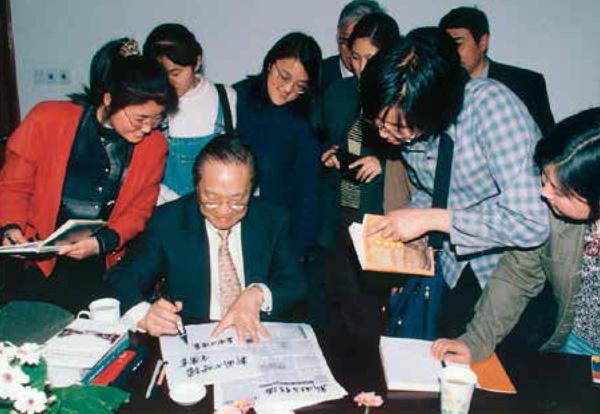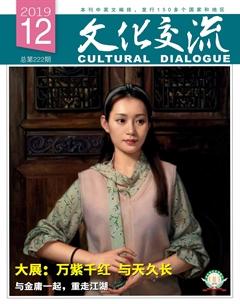重情重義的金大俠
張夢新


金庸先生的青少年時期正值日寇侵華、國難當頭,他的求學之路也是顛沛流離、異常艱辛,從家鄉海寧、嘉興,到杭州、麗水、衢州,乃至山城重慶,都留下了金庸求學的足跡。金庸先生對他曾經求學的學校和老師都一直懷著深深的感恩之心。
光陰似箭,仿佛轉眼之間,金庸先生已逝世一周年了。“有的人死了,他還活著。”(臧克家《有的人》)金庸先生就是這種活在人們心中的人,他活在故鄉的大地上,活在香江的云水間,活在金庸迷的江湖中,活在親朋好友的記憶里。
我與金庸先生相識二十多載,特別是1999年7月起在浙大人文學院有幸與先生共事6年,得以近距離親近先生,聆聽教誨。此時此刻,昔日與先生交往的情景,又清晰地浮現在眼前。
作為院長,盡職盡力
1999年3月26日,四校合并后的新浙江大學聘任金庸先生為人文學院院長。7月8日,學校就頒發了成立文件,并任命我為人文學院黨委書記。能與金庸先生這樣蜚聲中外的著名學者、文學家共事,人文學院班子的成員們都歡欣鼓舞。但我個人的內心卻也頗有些不安,雖然此前已在1994年4月原杭州大學聘請金庸先生為名譽教授時已與先生相識,但尚未深知,擔心在具體工作中不知是否好相處。但很快,金庸先生就以他謙謙君子的平易近人贏得了眾人之心,更以他對家鄉、對浙大、對教育事業的熱忱和切實的行動贏得了大家發自內心的敬佩和尊重。
新浙大在成立之初,提出要把浙江大學創建成一所世界一流的綜合型、研究型、創新型大學的奮斗目標。經過精心的準備后,1999年10月28日,金庸院長親自主持召開了浙江大學人文學科建設和發展大型研討會。這次研討會層次高、規模大,與會專家為浙江大學人文學科的建設發展提出了許多寶貴中肯的意見,不但使浙大人文學科進一步明確了今后發展的重點和思路,也提升了浙大文科在國內學術界的影響力和美譽度,提振了人文社科類師生勇創一流的信心與勇氣。這是金庸出任人文學院院長后的第一個大動作,也是漂亮的第一仗。這次會議后,學校啟動了人文社會科學“強所、名師、精品”建設計劃。
2002年初,作為浙大人文學院院長的金庸和經濟學院名譽院長查濟民又出面邀請了國內外的百余名專家學者,由浙江大學于2002年5月在杭州主辦了“新經濟條件下的生存環境與中華文化”國際研討會。3天會議期間,專家學者作了80余場學術報告,場場爆滿,取得了很好效果。金庸院長不但提交了題為《全球經濟與人文因素》的論文,還親自主編了該次會議的論文集《新經濟條件下的生存環境與中華文化》。
感懷師恩,重情重義
金庸先生的青少年時期正值日寇侵華、國難當頭,他的求學之路也是顛沛流離、異常艱辛,從家鄉海寧、嘉興,到杭州、麗水、衢州,乃至山城重慶,都留下了金庸求學的足跡。金庸先生對他曾經求學的學校和老師都一直懷著深深的感恩之心。
2004年10月27日,金庸先生回到了他闊別60多年、魂牽夢縈的母校衢州一中。《衢州日報》副總編、高級記者許彤以生動形象的文字記錄了當時的場景:
金庸先生還題詩一首贈予母校:“溫雅豪邁衢州人,同學少年若弟兄。六十年中常入夢,石梁靜巖夜夜心。”并于詩后寫道:“少年時負笈衢中,師長教誨,同學勉勵,常自懷念。今訪母校,見規模大張,日思昔日,不禁悲喜交集也。”
金庸先生的重情重義不僅是對待老師,對待母校,“滴水之恩,當涌泉相報”的中華民族的優良傳統也體現在許多小事中。
浙大人文學院成立后,于1999年12月印發了一本學院簡介。當時學院剛組建,經費很緊張。遠在深圳的任前,是我們新聞系1988屆的畢業生,他很關心母校,也是一個鐵桿金庸小說迷。當他偶然了解到浙大人文學院需要編印一本學院簡介后,便慷慨解囊,出資2萬余元在深圳印刷出版了600本裝幀精美的簡介,并快遞郵寄給人文學院。
半年后任前來電提起,不知能否請金庸先生為他的書畫苑題寫一副對聯。當我和金庸先生提起這一請求時,金庸先生二話沒說,爽快答應。
此時來杭,金庸院長先是召開人文學院聯席會議,會后又給院部機關工作人員和師生們的金庸小說簽名。由于金庸先生當晚還有活動,我們請他回賓館休息。當我傍晚快7點時去電聯系時,金庸先生秘書告訴我說,先生還在寫那副對聯,第一副不太滿意,又寫了一副,所以連晚飯還沒有吃。我聽了既慚愧不安,又為老先生這種一絲不茍和重情重義的精神而感動。這就是金庸先生所書之聯為:“苕霅溪山吳苑畫,瀟湘煙雨楚天云。”此聯現已成為任前書畫苑的鎮苑之寶。
有人說:活著的時候,讀者就以億來計算的作家,古今中外僅此一人,就是金庸。
從中國人的角度來看,金庸先生德高望重,94高齡,為人生旅途畫上了一個圓滿的句號,可謂了無遺憾。他的1000多萬字的15部武俠小說及其所弘揚的為國為民的俠義精神,為國家和民族注入了希望,將熠熠生輝,進入中國和世界當代文學的殿堂。
元好問《論詩絕句》云:“論功若準平吳例,合著黃金鑄子昂。”若以此語移譽先生對中國文化和武俠小說的貢獻,當也毫不為過。
I first met Master Jin Yong about 20 years ago and we worked as colleagues for six years at the Faculty of Arts and Humanities of Zhejiang University as of July 1999. What he said and what he did are still vivid in my memory.
On March 26, 1999, he was appointed as president of Faculty of Arts and Humanities of Zhejiang University after the four universities in Hangzhou merged into a new Zhejiang University. On July 8, I was appointed to be the secretary of the CPC committee of the Faculty. I felt both excited and slightly uneasy. I had met the master in April 1994 when he became an honorary professor at Hangzhou University. My worry was whether he and I could go along in our work together at the Faculty since I didnt know him personally after all. He soon won the hearts of us. His love of his home province and of Zhejiang University was touching. And his dedication to his work was impressive. Shortly after the merge in 1998, Zhejiang University came up with an ambitious objective: it plans to build itself into a world-class comprehensive university of research and innovation. In response to this development strategy, Jin Yong organized and presided at a forum on October 28, 1999 on the developmental strategy of the Faculty of Arts and Humanities. The forum was a sensational success. It not only gave birth to a long-term strategy for the Faculty but also enhanced the Facultys influence and reputation within the countrys higher education institutions. Shortly afterwards, the Faculty launched an action plan.
In May 2002, Jin Yong and Zha Jimin, a cousin of Jin Yong and honorary president of College of Economics of Zhejiang University, jointly organized an international symposium on the living environment and Chinese culture in the context of new economic conditions. At the three-day symposium, over 80 experts and scholars made presentations. Jin Yong submitted a paper. After the symposium, he acted as editor-in-chief and put together a collection of proceedings of the symposium.
The formative years of Jin Yong coincided with the years of war and chaos. His school education was disrupted frequently. The secondary schools and third schools where he received education were in Haining, Jiaxing, Hangzhou, Lishui, Quzhou and Chongqing. In his adult years, he still remembered his school years and felt deeply indebted to the schools and teachers. In October 2004, he revisited Quzhou No. 1 Middle School after a hiatus of 60 some years. The 81-year-old novelist and educator was warmly welcomed.
Shortly after the Faculty of Arts and Humanities came into being, we wanted to print a booklet for the faculty. It was in December 1999 and we were short of funds at that time. Ren Qian, an alumnus who graduated from Journalism Department in 1988 and who then lived in Shenzhen, learned about this problem by accident and offered to help us out. He paid 20,000 yuan for 600 copies which were printed in Shenzhen and delivered to us in Hangzhou. Half a year later, he called me to see if Jin Yong could write a couplet for him. It turned out that Ren Qian was a fan of Jin Yongs Wuxia novels. At that time, Jin was in Hangzhou, running a tight work schedule. When I mentioned Rens request, Jin said okay without hesitation. Later that evening, I called his secretary for business and I learned that Jin was so busy with writing a couplet for Ren Qian that he didnt have time for dinner yet. I was touched.
It is said that Jin Yong is a fiction writer of one kind: in his lifetime, he had more than 100 million readers. No one else at home and abroad has so many readers. He injected something special into literature.

